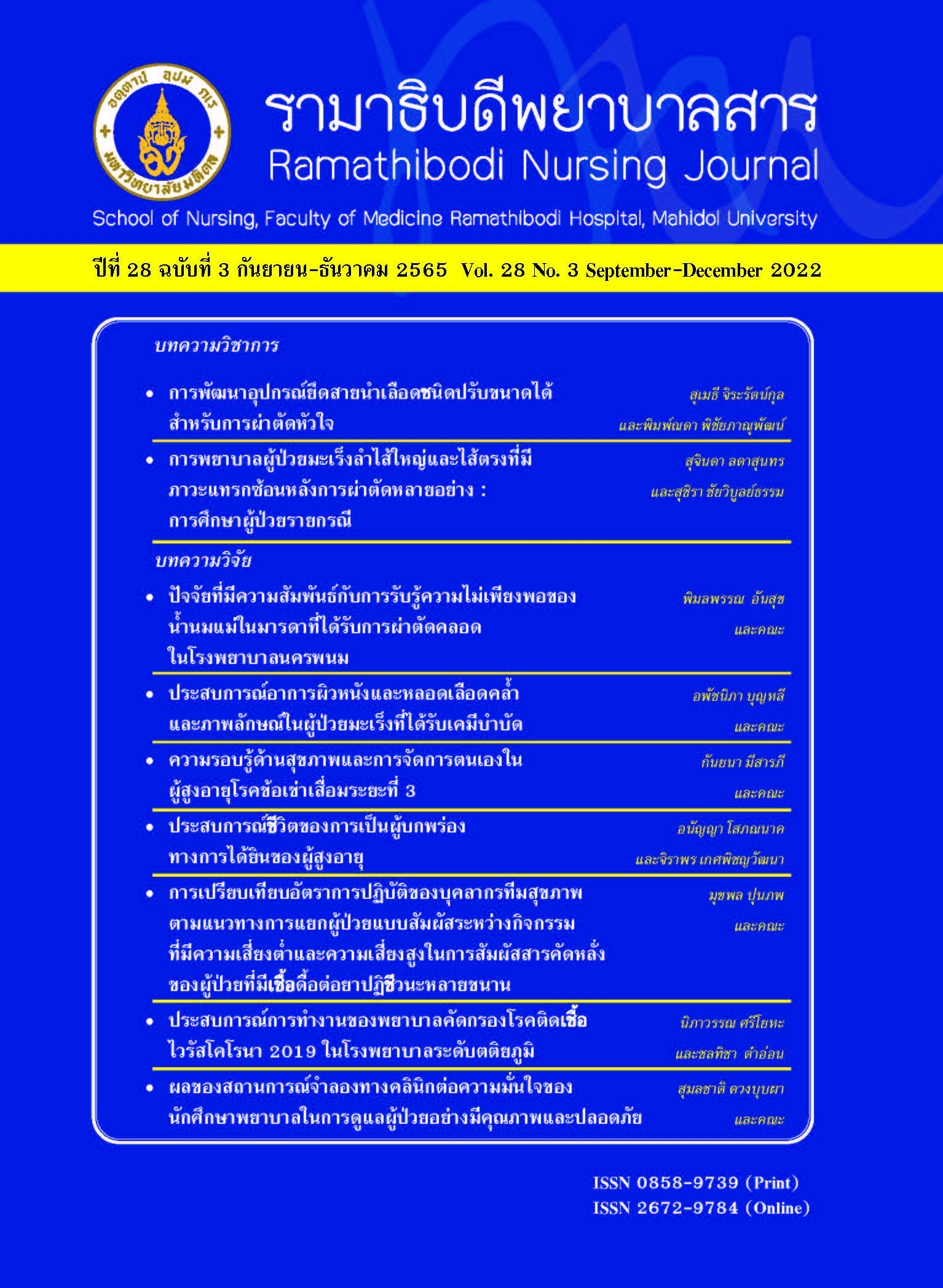Working Experience of Screening Nurses for COVID-19 in a Tertiary Care Hospital
Main Article Content
Abstract
The purpose of this qualitative research was to explain the meaning and working experience of screening nurses for COVID-19 in a tertiary care hospital. The Husserlian phenomenology method was applied to conduct this study. A purposive sample included 11 nurses who worked on screening for COVID-19 in one government tertiary care hospital in Bangkok. In-depth interviews with tape-recorded, observation,and field notes were performed to collect data. Audio tapes of the interviews were transcribed verbatim. Data were analyzed using Colaizzi’s method. The findings indicated that the meanings of working experience of screening nurses for COVID-19 in tertiary care hospital consisted of two major themes: 1) It is the duty to do, and 2) Being at the forefront of history taking and risk assessment so that the service recipient receives an appropriate examination. Working experience of the screening nurses for COVID-19 in the tertiary care hospital consisted of four major themes: 1) The work process changes according to the epidemic situation, 2) Problems to face, 3) Problems management,and 4) The impact of work has both positive and negative aspects. The results of this study provides an understanding of working experience of screening nurses for COVID-19 in a tertiary care hospital. The results of this study provide information for nurses and the multidisciplinary team in promoting quality and appropriate screening for people at risk of COVID-19.
Keywords: Working experience, Screening nurses, COVID-19, Tertiary care hospita
Article Details

This work is licensed under a Creative Commons Attribution-NonCommercial-NoDerivatives 4.0 International License.
บทความ ข้อมูล เนื้อหา รูปภาพ ฯลฯ ที่ได้รับการตีพิมพ์ในรามาธิบดีพยาบาลสาร ถือเป็นลิขสิทธิ์ของวารสาร หากบุคคลหรือหน่วยงานใดต้องการนำทั้งหมดหรือส่วนหนึ่งส่วนใดไปเผยแพร่หรือเพื่อกระทำการใด ใด จะต้องได้รับอนุญาตเป็นลายลักษณ์อักษรจากรามาธิบดีพยาบาลสารก่อนเท่านั้น
References
Picheansathian W. Personal protective equipment for COVID-19 by health care workers. Thai Journal of Nursing and Midwifery Practice. 2020;7(1):7-24.(in Thai)
Department of Disease Control Ministry of Public Health.Covid-19 situation reports [Internet]. 2021. [cited 2021Nov 29]. Available from: https://ddcportal.ddc.moph.go.th/portal/apps/opsdashboard
/index.html#/20f3466e075e45e5946aa87c96e8ad65
Siriphattrasophon S. The COVID-19 pandemic: impacts on Thai small and mediums enterprises and strategies for revival. Journal of the Association of Researchers.2020;25(2):10-30. (in Thai)
Sungkeaw S, Harnirattisai T, Srisatidnarakul B. Registered nurses’ competency in caring for emerging infectious diseases. Journal of Thailand Nursing and Midwifery Council. 2020;35(3):69-86. (in Thai)
Catania G, Zanini M, Hayter M, Timmins F, Dasso N,Ottonello G, et al. Lessons from Italian front-line nurses’experiences during the COVID-19 pandemic: a qualitative descriptive study. J Nurs Manag. 2021;29(3):404–11.
Karimi Z, Fereidouni Z, Behnammoghadam M, et al. The lived experience of nurses caring for patients with COVID-19 in Iran: a phenomenological study. Risk Manag Healthc Policy. 2020;13(1):1271-8.
Sadati AK, Zarei L, Shahabi S, Heydari ST, Taheri V,Jiriaei R, et al. Nursing experiences of COVID-19 outbreak in Iran: a qualitative study. Nursing Open.2020;8(1):72–9.
Tan R, Yu T, Luo K, Teng F, Liu Y, Luo J, et al.Experiences of clinical first-line nurses treating patients with COVID-19: a qualitative study. J Nurs Manag.2020;28(6):1381–90.
Sheng Q, Zhang X, Wang X, Cai C. The influence of experiences of involvement in the COVID-19 rescue task on the professional identity among Chinese nurses: a qualitative study. J Nurs Manag. 2020;28(7):1662–9.
Laochaicharoenphon P, Lertwatthanawilat W,Unahalekhaka A. Preparedness of tertiary hospitals in preventing emerging infectious diseases. Nursing Journal.2021;48(3):167-78. (in Thai)
Husserl E. Ideas; general introduction to pure phenomenology. 5th ed. London: George allen & Unwin;1969.
Colaizzi PF. Psychological research as the phenomenologist views it. New York: Oxford University Press; 1978.
Edge RM and Groves JR. The ethic of care: a guide for clinical practice. Delmer: Abny; 1994.
Liu YE, Zhai ZC, Han YH, Liu YL, Liu FP, Hu DY.Experiences of front-line nurses combating coronavirus disease-2019 in China: a qualitative analysis. Public Health Nurs. 2020;37(5):757–63.
World Health Organization. Minimum requirements for infection prevention and control. Geneva: World Health Organization; 2019.
Thongngam S, Pumool S, Ratanara R. Nursing care for patients with COVID-19 in the isolation unit, Siriraj Hospital. Siriraj Medical Bulletin. 2020;13(3):221-31.(in Thai)
Thobaity AA, Alshammari F. Nurses on the frontline against the COVID-19 pandemic: an integrative review.Dubai Med J. 2020;3(3): 87-92.
Delaney MB, Reed L. Recognizing and responding to a new era of infectious and communicable diseases. J Emerg Nurs. 2015;41(2):138-40.
Intolo S, Sihaboonnak T and Saisangjan N. Infection control nurse’ roles in infection prevention and control for COVID-19 within healthcare setting. Journal of Nursing and Health Care. 2021;39(1):14-21. (in Thai)
Silapavitayatorn B, Chitpakdee B. The use of health information technology in nursing for patient safety.Journal of Nursing and Health Care. 2020;38(2):6-14.(in Thai)
Goffman E. Stigma: notes on the management of spoiled identity. Englewood Cliffs, N.J.: Prentice-Hall; 1963.


